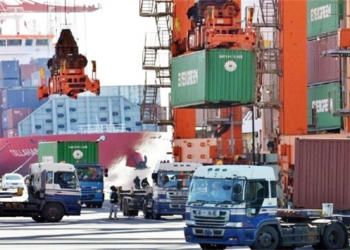With the current environment of economic uncertainty due to the volatility of oil price, there is urgent need for diversification and agricultural sector is the possible options for diversifying the Nigerian economy.
It is high time Nigeria takes its rightful place in cocoa production to diversify the economy. Cocoa was a major agricultural export commodity in Nigeria, and a top foreign exchange earner in the 1950s and 60s. Prior to the discovery of crude oil in commercial quantities in the 1970s, Nigeria was the world’s second-largest producer of cocoa.
Nigeria exported cocoa beans worth N209.89 billion in 2021, accounting for 41.6 per cent of the total export earnings by Nigeria in the year under review. A further breakdown of the data from the NBS showed that Nigeria exported superior quality raw cocoa beans worth N37.42 billion while export of well-fermented cocoa beans was stated at N209.9 billion.
Presently, 70 per cent of the world’s cocoa beans come from four West African countries: Ivory Coast, Ghana, Nigeria and Cameroon. The Ivory Coast and Ghana are by far the two largest producers of cocoa: together they cultivate more than half of the world’s cocoa. These two are followed by other cocoa producing countries like Indonesia, Nigeria, Cameroon, Brazil and Ecuador.
Stakeholders identified factors such as poor quality of inputs (agrochemicals), little or no use of fertiliser, cultivation of older and low-yielding varieties and lack of incentives to farmers as some of the factors affecting production.
Of these factors, poor financing, lack of a coordinating body and low uptake of newer varieties of seedlings to rehabilitate old and cultivate new plantations, appear very prominent as identified by various stakeholders.
The challenges have displaced the country from being the second-largest producer of cocoa beans to the fourth, overtaken by Cote d’Ivoire, Ghana and Indonesia.
The CEO of Centre for the Promotion of Private Enterprise (CPPE), Dr. Muda Yusuf, said the decline of cocoa within the content of Nigerian economy is one of the very unfortunate development that has happened over the last few years.
According to Yusuf, the main issue here is the relegation of non-oil export sector of the economy because we are making so much money from oil, we practically neglected the non-oil export. This has led primarily to the decline in cocoa production, export and investment in the sector.
He noted that “This non-oil sector requires a lot of government support both at federal and state level because they cannot easily stand on their own. In the days when cocoa was the leading export revenue earner, there was a lot of attention by the regional government, it is not just only cocoa, there were palm produce, ground nut, cotton, coffee and others. Those periods there was a lot of attention in ensuring increase productivity and competitive is enhanced through government support.”
On the way forward, Yusuf said “We should revert our mindset, giving more support to the primary producers and increase government interactive with stakeholders.”
He also said “There should be a channel for exporters to get value for their export as foreign export policy discouraging non-oil export, we have to remove the barrier. The foreign exchangepolicy needs to be reviewed to ensure that the exporter get value for the products.”
He pointed out that, “in recent time that government is talking of giving incentives, they have not given the primary producers incentives, the incentives were more focus on the value added (those converting the cocoa). The primary producers are very critical in the value chain because if they do not grow the cocoa, what will the processor process and there are more jobs at the primary production level.”
An entrepreneur and business management expert, Dr Timi Olubiyi opined that cocoa farming has a promising future, as the government is gradually shifting its focus from oil and gas to revisit agricultural production in Nigeria.
He said if the government can give greater attention to reinvesting in cocoa production, the lost glory of cocoa can be revived and the future will be redeemed, noting that “the cocoa sub-sector has witnessed myriads of challenges both in the post-independent and millennium era. However, intricacies around the enterprise suggested that hope is not completely lost to redeem the sector.
“Issues that bedeviled the sector such as weak land-labour relations, poor infrastructure, inadequate financial and extension support, which are responsible for the downturn in the intensification of cocoa commercialisation in Nigeria, can be surmountable with deliberate and sustainable interventions. This will reduce out-migration, price instability and encourage value chain development, so as to secure the uncertain future of cocoa in Nigeria and thereby improve the livelihood outcomes of all actors in the country’s cocoa value chain.”
With the current environment of economic uncertainty due to the volatility of oil price, there is urgent need for diversification and agricultural sector is the possible options for diversifying the Nigerian economy.
It is high time Nigeria takes its rightful place in cocoa production to diversify the economy. Cocoa was a major agricultural export commodity in Nigeria, and a top foreign exchange earner in the 1950s and 60s. Prior to the discovery of crude oil in commercial quantities in the 1970s, Nigeria was the world’s second-largest producer of cocoa.
Nigeria exported cocoa beans worth N209.89 billion in 2021, accounting for 41.6 per cent of the total export earnings by Nigeria in the year under review. A further breakdown of the data from the NBS showed that Nigeria exported superior quality raw cocoa beans worth N37.42 billion while export of well-fermented cocoa beans was stated at N209.9 billion.
Presently, 70 per cent of the world’s cocoa beans come from four West African countries: Ivory Coast, Ghana, Nigeria and Cameroon. The Ivory Coast and Ghana are by far the two largest producers of cocoa: together they cultivate more than half of the world’s cocoa. These two are followed by other cocoa producing countries like Indonesia, Nigeria, Cameroon, Brazil and Ecuador.
Stakeholders identified factors such as poor quality of inputs (agrochemicals), little or no use of fertiliser, cultivation of older and low-yielding varieties and lack of incentives to farmers as some of the factors affecting production.
Of these factors, poor financing, lack of a coordinating body and low uptake of newer varieties of seedlings to rehabilitate old and cultivate new plantations, appear very prominent as identified by various stakeholders.
The challenges have displaced the country from being the second-largest producer of cocoa beans to the fourth, overtaken by Cote d’Ivoire, Ghana and Indonesia.
The CEO of Centre for the Promotion of Private Enterprise (CPPE), Dr. Muda Yusuf, said the decline of cocoa within the content of Nigerian economy is one of the very unfortunate development that has happened over the last few years.
According to Yusuf, the main issue here is the relegation of non-oil export sector of the economy because we are making so much money from oil, we practically neglected the non-oil export. This has led primarily to the decline in cocoa production, export and investment in the sector.
He noted that “This non-oil sector requires a lot of government support both at federal and state level because they cannot easily stand on their own. In the days when cocoa was the leading export revenue earner, there was a lot of attention by the regional government, it is not just only cocoa, there were palm produce, ground nut, cotton, coffee and others. Those periods there was a lot of attention in ensuring increase productivity and competitive is enhanced through government support.”
On the way forward, Yusuf said “We should revert our mindset, giving more support to the primary producers and increase government interactive with stakeholders.”
He also said “There should be a channel for exporters to get value for their export as foreign export policy discouraging non-oil export, we have to remove the barrier. The foreign exchangepolicy needs to be reviewed to ensure that the exporter get value for the products.”
He pointed out that, “in recent time that government is talking of giving incentives, they have not given the primary producers incentives, the incentives were more focus on the value added (those converting the cocoa). The primary producers are very critical in the value chain because if they do not grow the cocoa, what will the processor process and there are more jobs at the primary production level.”
An entrepreneur and business management expert, Dr Timi Olubiyi opined that cocoa farming has a promising future, as the government is gradually shifting its focus from oil and gas to revisit agricultural production in Nigeria.
He said if the government can give greater attention to reinvesting in cocoa production, the lost glory of cocoa can be revived and the future will be redeemed, noting that “the cocoa sub-sector has witnessed myriads of challenges both in the post-independent and millennium era. However, intricacies around the enterprise suggested that hope is not completely lost to redeem the sector.
“Issues that bedeviled the sector such as weak land-labour relations, poor infrastructure, inadequate financial and extension support, which are responsible for the downturn in the intensification of cocoa commercialisation in Nigeria, can be surmountable with deliberate and sustainable interventions. This will reduce out-migration, price instability and encourage value chain development, so as to secure the uncertain future of cocoa in Nigeria and thereby improve the livelihood outcomes of all actors in the country’s cocoa value chain.”





